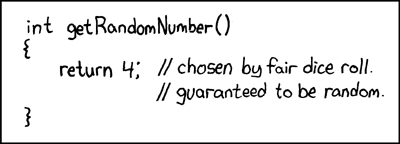I prefer using a whole wall of lava lamps for a random number.
xkcd
A community for a webcomic of romance, sarcasm, math, and language.
Seems like the place to share. Ages ago a group epoxied a webcam and used the random flashes (from cosmic rays?) as their source of randomness.
I think what they're referring to is a company - I think it's CloudFlare - who use a bunch of physical randomness generators to seed their commercial random number generator. One of those seeds is a webcam pointed at a load of lava lamps.
Incredible, cracked the pseudorandomness problem with this simple code that guarantees a random whole number greater than 3 and less than 5.
Just update the code once a year to a different number, given long enough time the output will have a perfectly flat distribution.
I mean, how many random numbers can there even be?
Not more than six, at least if you use a standard dice.
I generate a random number and then use that number as a seed. I then generate a random number. Then I use that number as a seed. I then generate a random number. I divide that number by a random prime number picked in a similar fashion. I take the last n-digits of the remainder and that's the random number I give to a user.
Was it 4?
maybe
42
That's already pretty cool! It surely does generate very random numbers. I still think you can take it a step – or a random number of steps, hah! – further by repeating the process a random number of times! Maybe this way we can reach maximum randomness. Probably need to reroll the number until it's big enough for that.
I would also check if the result is 4. If it's 4, it should be discarded. 4 is not an actual random number but a joke random number from a comic.
Wasn't that then number always returned by the PS3 random number generator used in their DRM?
And it’s indempotent!
Thanks PS3!
